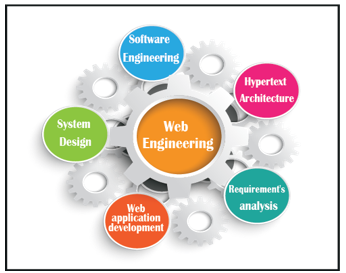Proposed Model for the Construction of the University of Al-Balqa' Applied e-Learning System Using Web Engineering Standards
Keywords:
Web Engineering, e-learning system, WebML methodAbstract
This paper aims to use web engineering to establish a suitable e-learning development strategy for the Al-Balqaʼ Applied University. A learning management system is crucial for teaching and learning, and with technological improvements, e-learning is becoming the norm in every country. As a result, developing and upgrading e-learning technologies to aid the educational process and improve students' learning experience is critical. The Al-Balqaʼ Applied University adopted Moodle as its primary e-learning system. As a result, the proposed e-learning system's web application development will be based on Moodle. Web applications will take a two-stage approach: the first stage will be analyzing the current application to gain a complete understanding of the requirements for developing the e-learning system at the Al-Balqaʼ Applied University, and the second stage will be converting or translating these requirements into the proposed model based on the WebML method, which has seven steps.
Downloads
References
J. R. M. Ríos, N. P. J. I. Souto, and s. technology, "Comparison of development methodologies in web applications," no. 119, pp. 1-13, 2020.
J. Manhas, M. Hussain, and A. Ali, "Web Engineering: A Multidisciplinary Approach For Web Development."
R. Britto, M. Usman, and E. J. J. o. W. E. Mendes, "A taxonomy of web effort predictors," pp. 541–570-541–570, 2017.
S. N. Samsudeen, R. J. I. T. Mohamed, and S. Education, "University students' intention to use e-learning systems: A study of higher educational institutions in Sri Lanka," 2019.
E. O. Mkpojiogu, O. E. Okeke-Uzodike, and E. I. Emmanuel, "Quality characteristics of an LMS UX psychomotor model for the design and evaluation of learning management systems," in 3rd International Conference on Integrated Intelligent Computing Communication & Security (ICIIC 2021), 2021, pp. 243-249: Atlantis Press.
A. J. I. J. o. C. A. Khtoom, "E-learning system at al-Balqa Applied University (BAU)," vol. 114, no. 14, pp. 6-8, 2015.
A.-F. D. J. M. J. C. i. H. B. Sinclair, "J Evaluating E-learning systems success: An empirical study," vol. 102, pp. 67-86, 2020.
I. J. E. T. R. Jung and Development, "The dimensions of e-learning quality: from the learner's perspective," vol. 59, no. 4, pp. 445-464, 2011.
J. J. S. g. Maintz, "Synthesizing the face-to-face experience: e-learning practices and the constitution of place online," vol. 3, no. 1, pp. 1-10, 2008.
M. Qteishat, H. Alshibly, M. J. E. J. o. B. Al-Ma'aitah, and Management, "Factors influencing the adoption of e-learning in Jordan: An extended TAM model," vol. 5, no. 18, pp. 84-100, 2013.
V. D. Gil-Vera, I. C. Puerta-Lopera, and C. J. M. A. S. Quintero-Lopez, "Structural Equation Model: an Analysis of Learning Management Systems Acceptance," vol. 14, no. 11, 2020.
K. Wakil, D. J. C. M. Jawawi, and N. Technologies, "Combining web engineering methods to cover lifecycle," vol. 21, no. 1, pp. 20-27, 2017.
E. R. Luna, J. M. S. Begines, J. M. Rivero, L. Morales, J. G. Enríquez, and G. J. J. o. W. E. Rossi, "Challenges for the adoption of model-driven web engineering approaches in industry," pp. 183-205, 2018.
G. Rossi, O. Pastor, D. Schwabe, and L. Olsina, Web engineering: modelling and implementing web applications. Springer Science & Business Media, 2007.
A. Halin, A. Nuttinck, M. Archer, X. Devroey, G. Perrouin, and B. J. E. S. E. Baudry, "Test them all, is it worth it? Assessing configuration sampling on the JHipster Web development stack," vol. 24, no. 2, pp. 674-717, 2019.
K. Wakil and D. N. J. J. S. Jawawi, "Comparison between Web Engineering Methods to Develop Multi Web Applications," vol. 12, no. 10, pp. 783-793, 2017.

Downloads
Published
How to Cite
Issue
Section
License

This work is licensed under a Creative Commons Attribution-ShareAlike 4.0 International License.
All papers should be submitted electronically. All submitted manuscripts must be original work that is not under submission at another journal or under consideration for publication in another form, such as a monograph or chapter of a book. Authors of submitted papers are obligated not to submit their paper for publication elsewhere until an editorial decision is rendered on their submission. Further, authors of accepted papers are prohibited from publishing the results in other publications that appear before the paper is published in the Journal unless they receive approval for doing so from the Editor-In-Chief.
IJISAE open access articles are licensed under a Creative Commons Attribution-ShareAlike 4.0 International License. This license lets the audience to give appropriate credit, provide a link to the license, and indicate if changes were made and if they remix, transform, or build upon the material, they must distribute contributions under the same license as the original.





